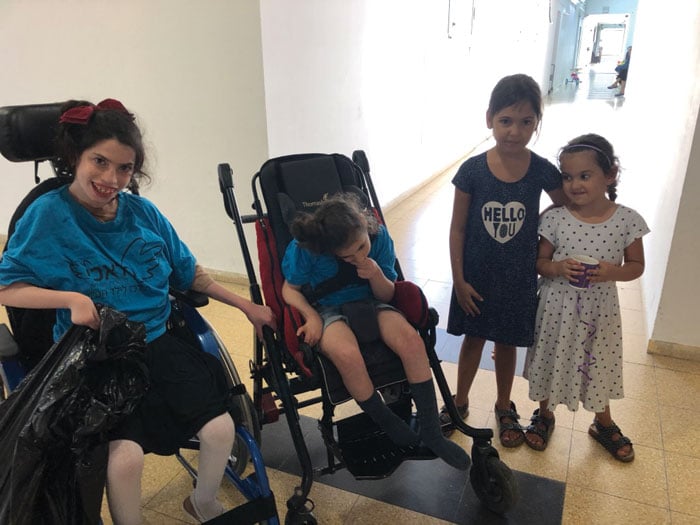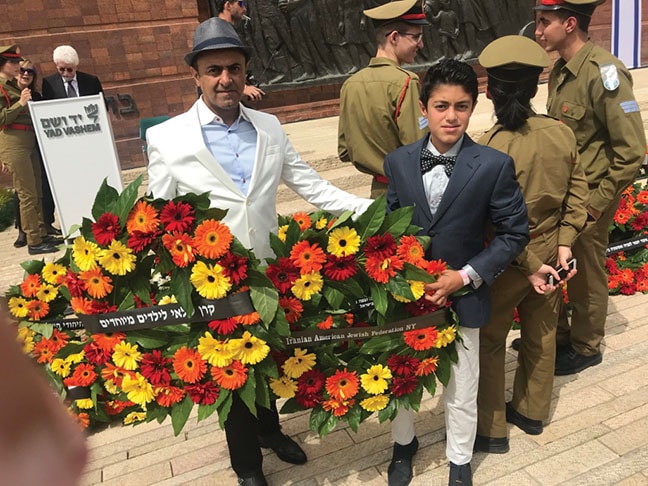 On the right, Albert’s daughters Malakhi, 8, and Pillie, 5, visited the special children at ILAI’s Camp Malakhi last summer. Photos courtesy Albert Elay Shaltiel
On the right, Albert’s daughters Malakhi, 8, and Pillie, 5, visited the special children at ILAI’s Camp Malakhi last summer. Photos courtesy Albert Elay Shaltiel Albert Elay Shaltiel and his wife Yael went through years of unsuccessful fertility treatments and were considering adoption. After visiting a facility for disabled orphans in Haifa, they started raising and distributing money for medical equipment and therapy for sick children. Then, in 2005, they were blessed with a natural pregnancy and a healthy son, Ilai Benyamin.
That same year, to express their gratitude for their son, they founded The ILAI Fund, a nonprofit organization that assists underprivileged special-needs, sick and disabled children in families experiencing financial hardships. It helps families from all religious backgrounds and circumstances around the world.
“I am here to serve,” Albert told the Journal. “And I am serving these children as I would my own child.”
Both Albert and Yael were born in Tehran in 1969. The couple immigrated to Israel individually and were married in the early 2000s. They spent time in New York and Los Angeles as well, but they wanted their child to be born in Israel.

Although Albert travels around the world to speak, meets with social workers, develops relationships with organizations and finds families to help, his Israeli base is in Modi’in. His son, now 17, frequently joins Albert on his visits to see the children the Fund helps. As a young child, Ilai would play with the sick children; he proudly brought them toys and books.
For Albert, everything he does and believes in relates to the organization’s mission: “To fulfill God’s biggest commandment: ‘Love thy neighbor as you love thyself.’”
The Foundation provides iPads to children with autism and cerebral palsy (iCan-iPad), funds for hearing aids and hearing implants for deaf and hard of hearing children (iHear) and diapers, medicine and other necessities for families struggling financially (iLive).
The Foundation provides iPads to children with autism and cerebral palsy (iCan-iPad), funds for hearing aids and hearing implants for deaf and hard of hearing children (iHear) and diapers, medicine and other necessities for families struggling financially (iLive). They also have programs that assist financially with wheelchair lifts (iMove) and mobility equipment (i-am-Independent).
The nonsectarian foundation has thus far helped more than 3,000 special children from needy families, mostly with single mothers. The recipients of the Fund’s generosity are called “Heroes,” while donors are referred to as “Donating Angels.”
Albert frequently receives calls from mothers asking for help or just checking in. Many of these mothers are living in poverty with no husband and some have more than one special child.
“These children don’t have an Abba, so I want to be [their] Abba,” he said.
He ends each call by telling the mother to say “Hello” to her child from him, and turns what starts as a sad conversation into a happy one.
“I ask them to tell [the child] no worries,” Albert said. “Moshe Rabbeinu was a special-needs child too (he had Ankyloglossia, or was tongue-tied), so if he made it and became the greatest leader, so can you. If his biblical parents, Amram and Yocheved, would send us a request, we would pay for his speech therapist expenses to help him with his stuttering behavior, as we do here for hundreds of special children.”
As Jewish Disability Awareness, Acceptance and Inclusion Month (JDAAIM) comes to a close, Albert has a message for parents of special needs children. “Please don’t hide them,” he said.
As Jewish Disability Awareness, Acceptance and Inclusion Month (JDAAIM) comes to a close, Albert has a message for parents of special children. “Please don’t hide them,” he said.
In Jewish communities, especially Orthodox, when families are making a shidduch (matchmaking), he said they think having a special-needs child would hurt the match.
“It’s a nonsense way of thinking,” he said. “Do not [leave] these children in their rooms. Bring them out. All of us are handicapped somehow … There is no perfection. Perfection only belongs to the great Creator of the universe.”
And for those who consider themselves fortunate, a lot can be done to make a difference.
“If you identify with [my] message, don’t just write a check for charity or tzedakah,” Albert said. “Act. Get a flower, gifts [and] some food and go to the hospitals and [visit].”
People in need are everywhere. Be aware of them and give them respect, he said.
“Believe in yourself, believe in humanity and believe in love. Believe in tikkun olam. We are here to be a light unto the nations.”























 More news and opinions than at a Shabbat dinner, right in your inbox.
More news and opinions than at a Shabbat dinner, right in your inbox.